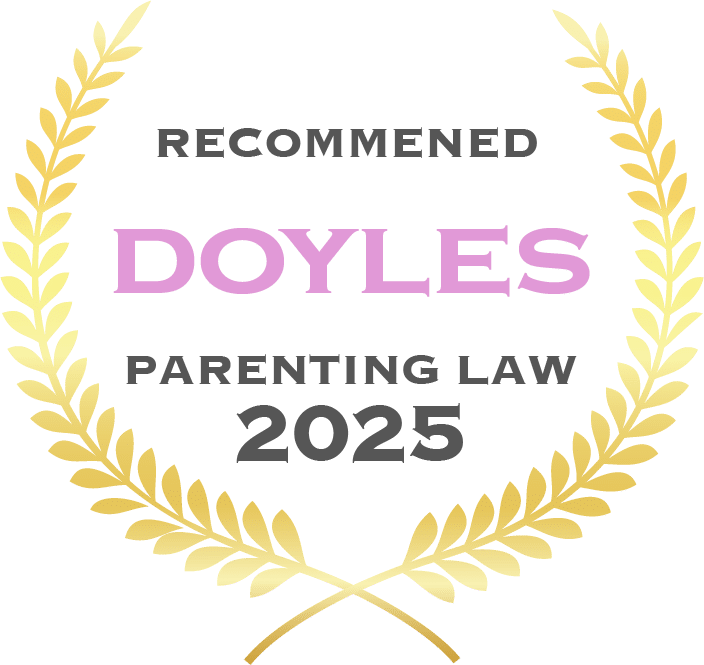At Stewart Family Law, our Brisbane child protection lawyers are dedicated to assisting individuals and families facing complex child protection matters. We understand the emotional strain of dealing with child safety issues, and our compassionate team is here to guide you through every step of the legal process.
Child protection cases can be incredibly stressful and emotional. Whether you’re responding to allegations or seeking to protect a child you know from harm, you need a trusted and knowledgeable legal team on your side. Our child protection lawyers work closely with you to ensure that children are protected, their best interests are upheld and that the legal processes are handled efficiently and with care.
Our team is well-versed in child protection matters and works diligently to ensure that the necessary steps are taken to safeguard children’s wellbeing.
Proud Members Of





At Stewart Family Law, we understand that child protection proceedings can be traumatic and overwhelming. Whether you are facing an application for a child protection order or if you’ve been served with a safety plan or court assessment order, we are here to support you.
Our team is experienced in working with parents, carers, and children who may be at risk or facing child protection concerns. We are committed to helping families resolve these issues in the best possible way and avoiding the need for lengthy or damaging court battles when possible.


Our team brings a wealth of experience and expertise in child protection matters. Judy Stewart, the Director of Stewart Family Law, is an Accredited Family Law Specialist with over 20 years of experience in family and child protection law.
With a focus on providing tailored solutions for each unique case, our lawyers can assist with a wide range of issues, from navigating child protection services and negotiating child safety plans to representing clients in court.
Our goal is to always place the safety and welfare of the child at the heart of our strategy while guiding you through the legal process with sensitivity and professionalism. When you need assistance understanding child protection legislation, we’re here to support you.
If you’re involved in a child protection case, it’s essential to act as soon as possible. The sooner you receive legal advice, the better your chances are of protecting your rights and securing the best outcome for children involved.
If you need help understanding child protection law or have questions about child protection orders, care orders or responding to child safety services, our team is ready to assist you. Get in touch for a confidential chat today.
"*" indicates required fields




When it comes to child protection, the safety and wellbeing of your child are of utmost importance. Our team understands the sensitive and complex nature of these matters, which can involve government agencies, the Children’s Court and a range of legal and administrative proceedings. If you are dealing with concerns around child safety, it’s essential to act quickly and seek legal advice from experienced professionals.
We can assist you with a wide range of child protection matters, including:
By working with our team, you can feel confident that your legal options are clearly laid out and that your family’s best interests are our priority.
The Child Protection Act 1999 is Queensland’s primary legislation governing child protection. It outlines the responsibilities of government agencies and individuals to ensure the safety and wellbeing of children. The Act provides a legal framework for intervening in cases of child abuse, neglect, and harm and establishes procedures for child protection orders, care arrangements, and decision-making regarding children at risk.
A Child Protection Order is a legal order made by the court to protect a child from significant harm or risk of harm. Such an order is only made when the court determines that a child faces an unacceptable risk of suffering harm and that intervention is necessary to ensure the child’s safety and wellbeing.
These orders can involve placing the child with a safe caregiver, having someone supervise the child’s safety, or taking custody away from parents. The goal is to ensure the child’s safety while also working to improve the situation so the child can stay with or return to their family if possible.
Child protection is a highly complex area, and there are many different levels of involvement they may have in a child’s life if they are deemed at risk in their home. This may range from investigations to short-term orders or permanent orders being made through the court system.

If you are a parent facing the possibility of a Child Protection Order (CPO) or are a concerned individual who believes a child may be at risk, it is crucial to understand the child protection legal process in Queensland. The safety and wellbeing of children are paramount in Australian law, and when concerns about a child’s safety arise, immediate action may be needed.
Whether you’re facing a situation where child safety have intervened, or you are worried about a child’s safety and want to act on their behalf, it is essential to respond quickly. We are here to help you through this process, protect your rights and secure the best possible outcome for your family.
If you are concerned about a child’s safety due to physical harm, neglect, or exposure to family violence, the first step is identifying the issue. If you believe a child is at immediate risk, it’s crucial to act fast by either contacting Child Safety or seeking legal advice.
If you’re a parent who has received notice of a child protection concern, it’s essential to act quickly and seek guidance. If you’re a concerned third party, you can reach out to Child Safety or a lawyer to ensure the child’s wellbeing is prioritised.
If a child is at risk of harm and immediate protection is needed, an application for a child protection order may be made by Child Safety. Child protection orders are designed to protect a child from harm. The aim is to return a child to their caregiver if the need for protection can be resolved. All child protection orders are time limited and are intended to be the minimum order required to protect the child.
If you are a parent facing a child protection concern, our lawyers can help you respond to child protection orders and work with you to demonstrate your ability to provide a safe environment for your child. If you are a concerned individual, we can help you take legal action to protect the child and ensure their safety.
When Child Safety determine that a child cannot remain safely with their family, they may place the child in out-of-home care. This decision can lead to care orders and arrangements designed to safeguard the child’s wellbeing.
If you are a parent, our lawyers will help ensure the care arrangements are in line with the child’s best interests and work with Child Safety to explore possible reunification or support services. For concerned parties, we can assist you in advocating for the child’s safety and wellbeing through appropriate legal channels.
Child protection matters often involve sensitive family dynamics. We can attend and represent you at Family Group meetings, Court Ordered Conferences and Reunification Meetings. During these meetings we can advocate your position in relation to a child safety application, assist with negotiating achievable and realistic case plan goals, negotiate contact arrangements and help find solutions that prioritise the child’s safety while addressing the family’s needs.
If Child Safety assess that a child is in need of protection they can apply for a Child Protection Order. If an application is made a Magistrate in the Children’s Court will make decisions based on the best interests of the child, considering all evidence, the child’s welfare, and the nature of the allegations.
If you’re a parent facing child protection proceedings and the intervention of the Department, we will ensure that your position is fully represented. If you are a concerned individual, our lawyers can help advocate for the child’s interests to ensure their safety and wellbeing is the focus of any court decisions.
Different types of orders can be made in Queensland, usually between the state and the child’s parent or guardian. Each order has unique implications, and understanding them is essential for families facing legal challenges.
Temporary Assessment Order (TAO)
Court Assessment Order (CAO)
Temporary Custody Order (TCO)
Protective Supervision Order (PSO)
Short-Term Custody Orders
Long-Term Guardianship Orders

In Australia, Child Safety (previously referred to as DOCS) can remove a child if they are at significant risk of harm. They must follow legal procedures and work to ensure the child’s safety, either by keeping the child in care or returning them to the family when possible.
Children’s Court proceedings involve legal processes to assess and determine child protection orders. The court evaluates evidence to ensure the child’s safety, and decisions are made regarding custody or placement. Lawyers represent both parents and children, ensuring the child’s best interests are prioritised.
The Department of Families, Seniors, Disability Services and Child Safety (Child Safety) is the lead agency in Queensland responsible for protecting children from harm. Its aim is to enforce the Child Protection Act 1999 and ensure children’s safety by intervening when parents cannot protect their children from significant harm.
The Office of the Public Guardian in Queensland advocates for children and young people involved in child protection matters. Their legal officers represent the child’s views in court, ensuring their wishes are considered, and may cross-examine witnesses during hearings.
The Office of Child and Family Official Solicitor (OCFOS) provides legal advice and support to Child Safety staff. They apply for urgent orders, such as assessment and custody orders, and prepare evidence for the Director of Child Protection Litigation (DCPL) for court proceedings.
The Office of the Director of Child Protection Litigation (DCPL) decides whether to apply for a child protection order. They make applications and represent the state in court proceedings, ensuring the child’s safety and wellbeing are prioritised through legal action.
If you need help understanding child protection law or have questions about child protection orders, care orders or responding to child safety services, our team is ready to assist you. Get in touch for a confidential chat today.
Contact
Office Address
Level 2/231 North Quay, Brisbane City, QLD 4000
Mailing Address
PO Box 12570 George Street Brisbane QLD 4003
Our Services